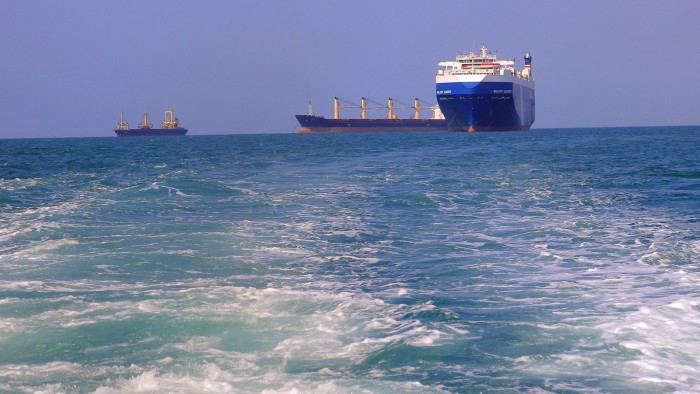Unlock the Editor’s Digest for free
Roula Khalaf, Editor of the FT, selects her favourite stories in this weekly newsletter.
The crew of a Greek-owned cargo ship was forced to abandon the vessel in the Red Sea on Sunday after the first suspected attack by Yemen’s Houthis this year on a commercial vessel.
If confirmed as the work of the Houthis, the attack on the Magic Seas, a dry bulk carrier owned by Greece’s Stem Shipping, would be the first on a commercial vessel since December by the group, which is backed by Iran.
Michael Bodouroglou, Stem Shipping’s chief executive, told the Financial Times the crew had been left “terrified” by the multiple waves of attacks, which started with an assault by men in skiffs and left the ship taking on water.
“They didn’t know whether they were pirates or Houthis but then it became obvious they were Houthis because there were more and more, and there were missiles,” Bodouroglou said.
Martin Kelly, head of advisory for marine security company EOS Risk Group, said the attack marked a “huge shift in intent” by the Iran-backed group, both because it was the first in so long and because of the scale of the attack.
Pointing to the apparent use of skiffs, uncrewed surface ships and missiles fired from drones, Kelly said: “They meant to sink this ship.”
The vessel was carrying a mixture of steel products and fertiliser from China to Turkey, said Bodouroglou. He insisted the current voyage had no links to Israel — the reason usually cited by the Houthis for attacking ships — but acknowledged his vessels sometimes called at Israeli ports.
Bodouroglou said missiles had started fires in the forecastle near the ship’s bow and in its second hold. The vessel’s fuel tanks were damaged and the engine room hit, leaving it taking on water.
The crew was in the course of abandoning ship, he said, adding that the vessel might sink.
“The good thing is no crew member has been hurt,” Bodouroglou said.
The UK’s Maritime Trade Operations office subsequently confirmed the entire crew had left the ship and were “awaiting assistance”. The vessel was 51 nautical miles south-west of Hodeidah, the Houthis’ main port, at the time of the attack, the office said.
The Houthis did not immediately claim responsibility. However, no other group has mounted similar attacks in the Red Sea in recent years.
The Houthis have said they are attacking ships in support of Gaza’s Palestinians. Their first attack — on the car carrier Galaxy Leader — took place in November 2023, shortly after Hamas’ October 7, 2023 attack on Israel.
The group stopped attacking commercial vessels in the run-up to the start of a ceasefire in Gaza in January and had not resumed them since then, despite the collapse of that truce in March.
The group has instead focused on firing missiles repeatedly at targets in Israel, such as the country’s main airport.
In May US President Donald Trump said the US would stop its bombing campaign against the Houthis in response to assurances from the Iranian-backed group that it would halt its attacks on ships.
The Houthis’ previous attacks on commercial ships between November 2023 and December last year sank two vessels, set fire to another three and killed at least four mariners. The attacks prompted many shipowners to redirect vessels away from the Red Sea and Suez Canal and to sail round the Cape of Good Hope.
Crude oil and product tankers had slowly begun returning to the Red Sea following this year’s lull in attacks, said Clarksons, the maritime information provider. However, owners of container ships and some other vessel types have continued to avoid the area.
Bodouroglou said he would reassess whether to go via the Red Sea on future voyages in light of the attack on the Magic Seas.



